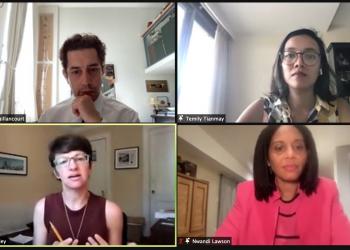BIC event looks at the role of journalists in building unity and exploring reality
Journalists from Ghana, Malaysia, and the United States discussed a range of themes related to their field in an event hosted by the Baha’i International Community (BIC) entitled “The Media, the Narrative, the People & their Leaders.”
“The media can play a positive role in creating consensus, building unity, generating knowledge and shared understandings,” noted Saleem Vaillancourt, who moderated the event on behalf of the BIC. “In doing so, it can help people solve real problems.”
Held August 10, the online event explored the role news media can play in fostering constructive and non-adversarial responses to social challenges. The discussion touched on themes ranging from journalists as social and moral actors, the role of trust in media and society, means of transcending polarization and intractable conflict, and the impact of precision and clarity in language.
Amanda Ripley, an investigative journalist for The Atlantic magazine, highlighted the social benefits of showcasing communities’ attempts to overcome challenges. “When people feel there is no hope, they can give up or become cynical,” she said. “If you do good journalism around attempts to solve problems, people are much more engaged than by problem journalism alone,” referring to forms of journalism that discuss problems without exploring solutions.
“The solution in the story doesn’t need to have worked,” Ripley added. “Just the community trying to solve its own problem shows agency. And that engages people across all sorts of demographics.”
The care with which people are viewed and depicted in news stories was explored by Temily Tianmay, an academic with experience in local and international television news outlets across Hong Kong and Malaysia. “The lens of human dignity allows us to build unity in new ways,” she said.
“If we view every individual as a dignified being and a source of insight—how will we treat not only our sources, but also other journalists who may approach their work very differently from ourselves?”
Janet Abena Quainoo, a Ghanian journalist focusing on humanitarian issues, spoke of the importance of the motivations of journalists themselves. “There’s a reason that made each one of them want to be a journalist. They should focus on that reason,” she said of those in the field.
The role of journalists as protagonists in the betterment of society – and the degree to which they are embedded and active in the communities on which they report – was also discussed during the panel.
“In order for us to really think about the impact of media on governance, we can’t stand so aloof from it,” remarked Nwandi Lawson, a former journalist with CNN, Turner Broadcasting, and Georgia Public Broadcasting. “We have to recognize that we are social actors. We are part of our society. We have an obligation to search out truth,” she added.
The discussion was organized in light of growing interest about how to generate the collective volition and commitment needed to achieve major intergovernmental initiatives such as the United Nations’ Sustainable Development Goals and the Paris Climate Agreement. The event is part of the Baha’i International Community’s ongoing consideration of the prerequisites of effective global governance.
